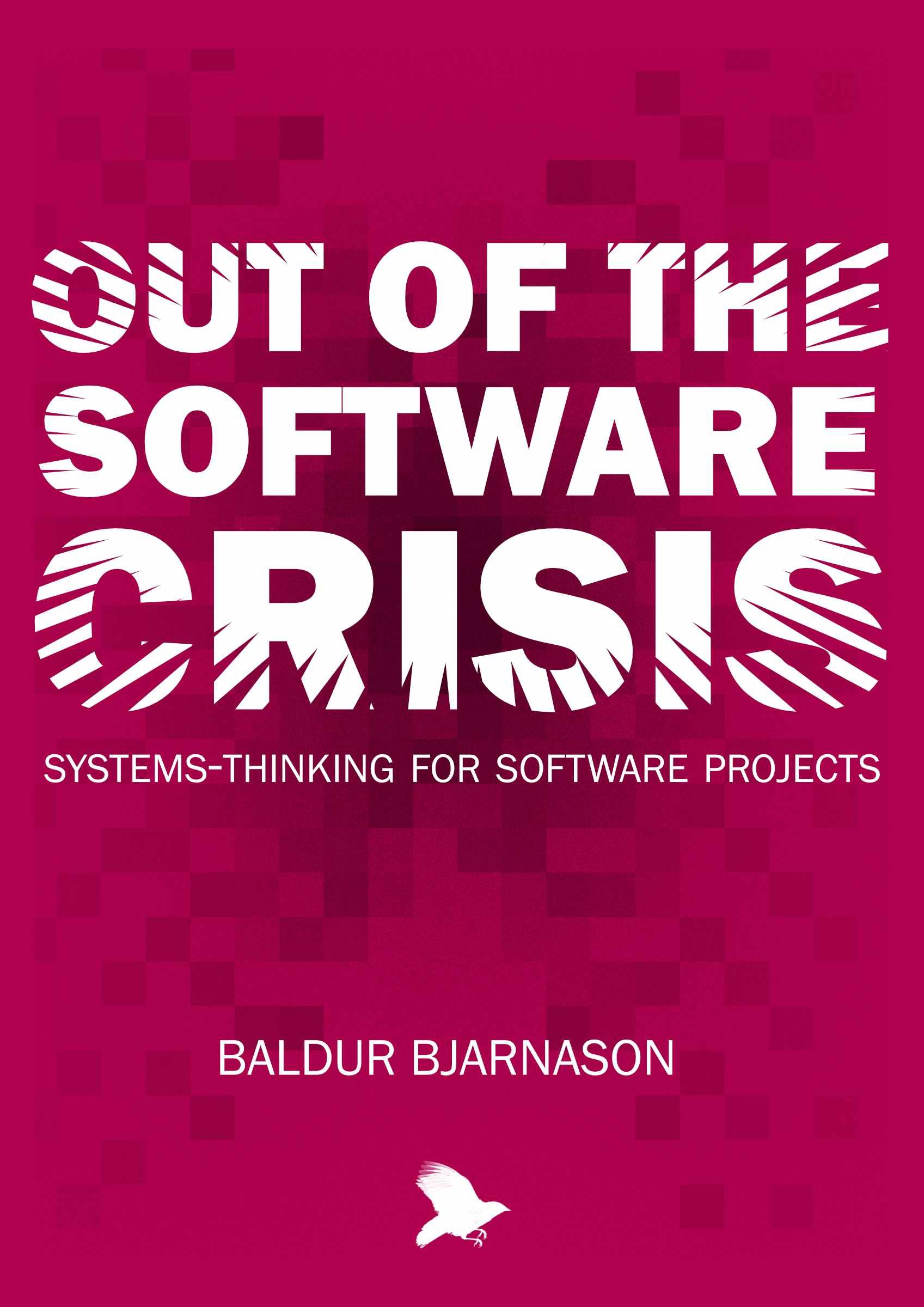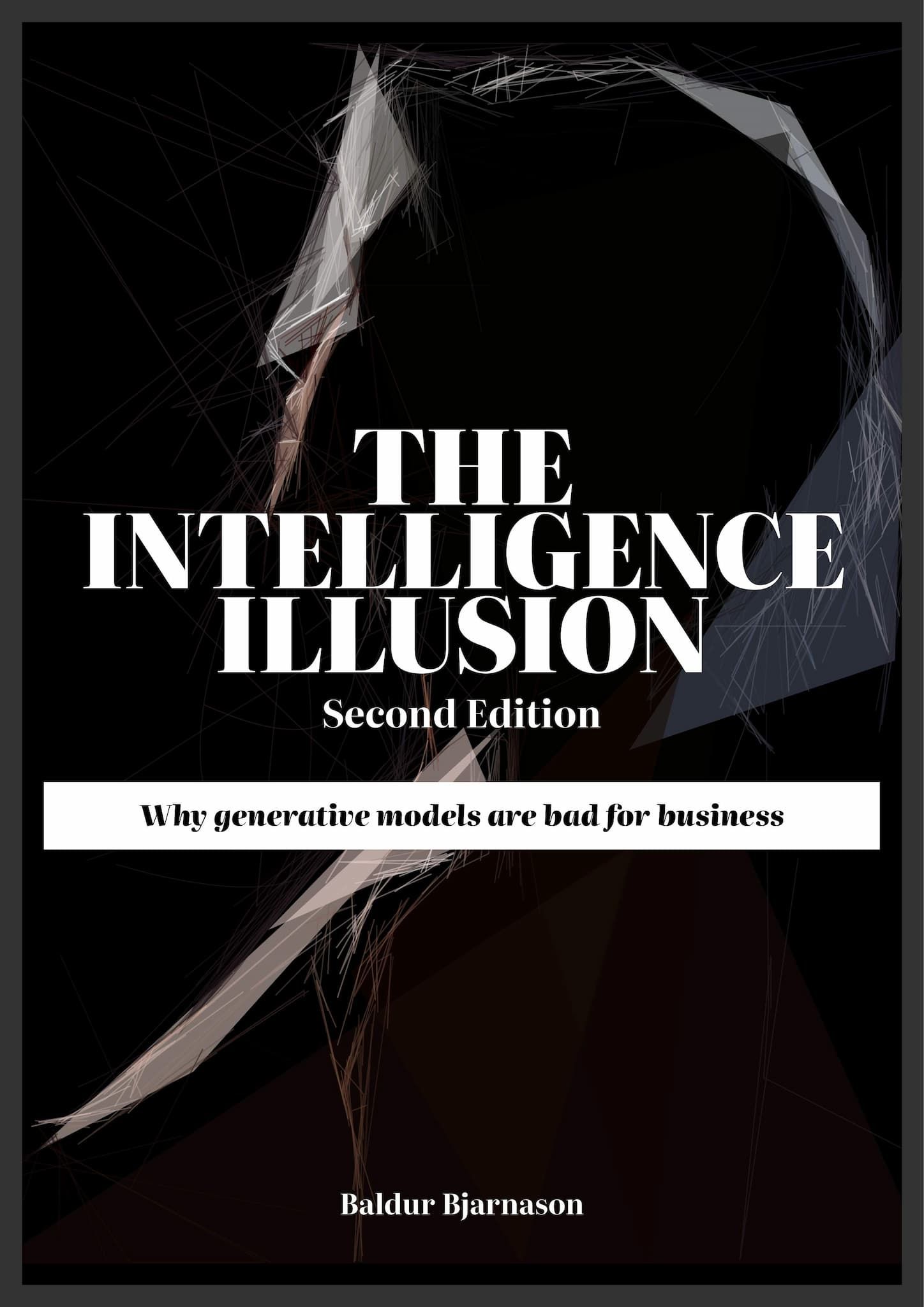The Ebook Bundle for $49
You can get all four ebooks in a single €59 EUR bundle, at an almost 50% discount off the combined price.
That €59 EUR bundle includes:
- Out of the Software Crisis: Systems-Thinking for Software Projects, an opinionated guide to the systems-thinking perspective on software development.
- The Intelligence Illusion: a practical guide to the business risks of Generative AI, an overview of the many risks and pitfalls of using generative models in your business backed by in-depth research.
- I am Uncluttered (Yellow): doom-prepping web dev through disdain, disrespect, and doing the right thing.
- Bad Writing and Other Essays: Twenty-Five Years of Writing About the Digital Transformation
Buy the Ebook Bundle for €59 EUR
Out of the Software Crisis #
Software projects keep failing, not because we don’t have the right team or tools but because our software development system is broken. Out of the Software Crisis is a guide to fixing your software projects with systems-thinking making them more resilient to change and less likely to fail.
Praise for Out of the Software Crisis #
The only issue so far with @baldur’s book is how distracted I am by the typography. It’s a bit too good 😅
I’ve bought your book based solely on the extract about the business value of unit testing on the website. I read that and thought “YES! At last! Someone’s said it.” and wondered what else you have to say. I’m looking forward to reading it. :)
I read @baldur’s book ‘Out of the Software Crisis’ on the flight over yesterday and I’d strongly recommend reading it.
The book tries to frame a lot of software failures by moving up an abstraction from tactics like “hey did you assign the right story points” to a more nuanced look at how companies manage software as a whole
Hoping to beat my roughly 50/50 ratio of big software projects succeeding in my career with (Thing I’m working on) and this book gives me new primitives for thinking about it.
Reading Out Of The Software Crisis by @baldur and this hits hard:
“Most software companies overshoot their software development system complexity by a substantial margin because the margins on software businesses are so good. When times are good, everything you do seems to lead to growth. You begin to associate your random actions with random fluctuations in the market. Managers build mental models for how the market works that have no relation with reality.”
This is basically a book full of hot takes and I’m here for it.
“Out of the Software Crisis” by @baldur is a great book and well worth the read. Highly quotable, and really challenged my view of software development in a few places.
Too many great quotes, but here’s one that hit me in the gut:
“Truly catastrophic software failures rarely get discovered in a sprint review or shipping retrospectives. The serious bugs that induce panic attacks only appear once the software is distributed widely enough to begin to experience edge cases. Most of the time, that only happens long after the software development team has moved on and marked the project as successful or challenged.”
Love this quote about design from “Out of the software crisis” by @fakebaldur: “Decoration [is] the least important thing design does for software…[aesthetics] is part of what design does. It isn’t what you hire designers to do.”
Really great as an introduction to systems thinking as applied to software design. It isn’t used as much as a guide or resource, but as a way to get a lay of the land.
This book “out of the software crisis” by @baldurbjarnason is really good 👍
I cannot recommend it highly enough
Just finished @baldur’s new book “Out of the Software Crisis”. It’s a whistle-stop tour of the history and current state of #software development, and an intro to systems thinking. Very relatable if you’re a #webdev, and has inspired me to read more…
“Out of the Software Crisis” by @baldur is so good that I shared it with our executive management team. It’s short, non-technical, well-researched and identifies the key reasons software projects fail and how to improve the chance of success. Hoping this authoritative little book will help our team look beyond the waterfall/agile/safe/whatever dogmas to the importance of the wider organization in determining success.
Buy the Ebook Bundle for €59 EUR
The Intelligence Illusion #
A practical guide to the business risks of Generative AI
What are the major risks to avoid with generative AI? How do you avoid having it blow up in your face? Is that even possible?
The Intelligence Illusion is an exhaustively researched guide to the risks of language and diffusion models.
Praise for The Intelligence Illusion: a practical guide to the business risks of Generative AI #
Amid the current AI tsunami, I knew it was time to do my share of learning this stuff by filling gaps among pieces of my fragmented knowledge about it and organize my thoughts around it. This book served that purpose very well.
Generative AI, ChatGPT and sorts, have been released prematurely with too many, too much downsides for possible benefits. It’s especially so when it comes to commercial use. This book walk you through possible risks your business might encounter if you casually incorporate it.
Many of his arguments opened my eyes. I’m glad I found his book at this timing. It’s a hype, at least for now and a foreseeable future. Use cases will likely be very limited. And to protect ourselves from bad actors, we need solid regulations, just like in the case of crypto.
The Intelligence Illusion is full of practical down-to-earth advice based on plenty of research backed up with copious citations. I’m only halfway through it and it’s already helped me separate the hype from the reality.
Should we build xGPT into our product?
Before you answer, make sure to take advantage of all the homework Baldur Bjarnason has done for you.
Back when I worked in publishing, I employed Baldur Bjarnason as a consultant on complex digital publishing projects, as I appreciated his ability to grasp technical detail and translate it into terms that a general manager could understand - and act upon. He has applied that same skill to a superb new ebook on the business risks of generative AI, which I was lucky enough to read in advance of publication. It combines deep research, logical analysis and clear business recommendations.
I bought it, and I read most of it (skimming the middle part), and it is brilliant. Thank you!
I just bought the book this morning and it’s exactly what I needed. I have not seen a clearer description of how generative AI works, what it might be good for, and what the risks are. The references alone are worth the price of the book.
When it comes to the current hype surrounding AGI and LLMs, whether you’re a true skeptic (like me) or a true believer, The Intelligence Illusion is a splash of lemon juice in the greasy pool of incredulous media coverage. Accessible for anyone who’s spent more than 15 minutes with a clueless executive or myopic developer (or, frankly, engaged with any of the technological “disruptions” of the past two decades), Bjarnason rigorously unpacks the many risks involved with the most popular use cases being promoted by unscrupulous executives. He brings plenty of receipts to support his observations, too, while also spotlighting areas where this technology might have legitimate potential for good. Highly recommended!
PS: The images throughout do an amazing job of subtly reinforcing the book’s title and premise and would be worthy of a print edition.
Buy the Ebook Bundle for €59 EUR
I am Uncluttered (Yellow): doom-prepping web dev through disdain, disrespect, and doing the right thing. #
I am Uncluttered (Yellow) is the combined second edition of Uncluttered, my earlier course on vanilla JS test-driven development, and Yellow, a short book collecting some of the more useful principles of management and software development. This new edition has been comprehensively restructured and rewritten and is almost twice the length of its predecessors combined and has:
- An overview of some of the more pragmatic principles in management, software development, and systems-thinking.
- A study of the feature of JavaScript that is simultaneously its greatest advantage and its greatest disadvantage
- A high level overview of some of the core principles of test-driven development as applied to web dev.
- A few ideas how to tackle JavaScript dependency hell.
- As well as an appendix that outlines some of the simplest possible dev tools that still might work for you.
Buy the Ebook Bundle for €59 EUR
Bad Writing #
€10+ EUR for PDF and EPUB.
Twenty-five years of writing on digital transformation, digital publishing, innovation, and software development



